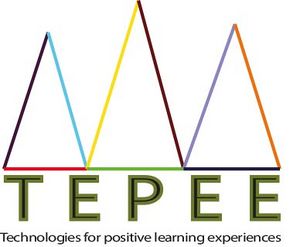TEPEE
*TEPEE (Technologies for Positive lEarning Experiences) est un groupe de recherche initié par le Pr. Gaëlle Molinari et qui est associé conjointement au TECFA (Faculté de Psychologie et des Sciences de l’Education, Université de Genève) et à UniDistance. Les recherches au sein de TEPEE se structurent autour d'un thème en émergence, les technologies positives pour l’apprentissage, thème qui prend appui sur différents domaines : la psychologie des émotions et ses travaux sur le rôle des émotions dans l'apprentissage (Pekrun, 2006) ; la psychologie positive qui concerne l'étude scientifique des facteurs qui favorisent le développement du plein potentiel (Vallerand & Bragoli-Barzan, 2019) ; la technologie positive qui se centre sur la conception et l’usage des technologies numériques pour promouvoir le fonctionnement optimal des individus, des groupes et des organisations (Gaggioli, Villani, Serino, Banos, & Botella, 2019).
Parmi les objectifs de recherche actuels du groupe TEPEE figurent :
- celui de comprendre comment améliorer l’expérience apprenante des étudiant.e.s en formation hybride/à distance, notamment comment les aider à se maintenir engagé.e.s, à faire face à la pression à l'autorégulation, aux fluctuations de motivation et d'énergie ;
- et celui de comprendre le rôle des émotions dans l’apprentissage collaboratif à distance, notamment comment aider les apprenant.e.s à prendre conscience des émotions ressenties et les utiliser pour mieux collaborer.
**TEPEE (Technologies for Positive Learning Experiences) is a research group initiated by Pr. Gaëlle Molinari, and jointly associated with TECFA (Faculty of Psychology and Educational Sciences, University of Geneva) and UniDistance.TEPEE's research is structured around an emerging theme, positive technologies for learning, a theme that draws on various fields: Psychology of emotions and its work on the role of emotions in learning (Pekrun, 2006); Positive Psychology which concerns the scientific study of factors that promote the development of individuals' full potential (Vallerand & Bragoli-Barzan, 2019); Positive Technology, which focuses on the design and use of digital technologies to promote the optimal functioning of individuals, groups, and organizations (Gaggioli, Villani, Serino, Banos, & Botella, 2019). Current research goals of the TEPEE group include: understanding how to improve the learning experience of students in hybrid/distance learning, including how to help them stay engaged, cope with pressure to self-regulate (Cosnefroy, 2010), also cope with fluctuations in motivation and energy; and understanding the role of emotions in online collaborative learning, including how to help learners become aware of the emotions experienced during group work and use them to better collaborate.
Les membres du groupe TEPEE
Doctorant.e.s / PhD students
- Yannick Stéphane Nleme Ze. Yannick Stéphane Nleme Ze is a PhD student in Education Sciences at the TECFA research unit (University of Geneva) under the supervision of Prof. Gaëlle Molinari. He is also a Teaching and Research Assistant and organizes with Prof. Molinari, the Digital Learning and Distance Education course (ADID), and co-leads the Master of Science in Learning and Teaching Technologies (MALTT) theses. On the research side, Yannick Stéphane Nleme Ze has an interest in learner engagement in distance learning contexts, as well as in motivation to learn with ICT in both secondary and higher education. As part of his thesis, he is conducting research on learner engagement in MOOC discussion forums. His work aims to identify the dimensions, indicators and factors of engagement in MOOC discussion forums, design and validate a scale to measure this engagement and analyze the different levels of engagement observed between the structured and unstructured MOOC discussion forums. Before starting his thesis, Yannick Stéphane Nleme Ze worked for 10 years as a high school physics teacher. He holds a secondary and high school teacher's diploma from the higher teacher training college of Yaoundé (University of Yaoundé 1, Cameroon), a Master's degree in technological innovation (University of Angers, France), a Master's degree in educational technology (University of Montreal, Canada), and a University Research Diploma in digital education (University of Lille, France). Keys words: Engagement, motivation, distance learning, MOOC, discussion forums, ICT in education. Further information: https://orcid.org/0000-0001-8212-678X
- Cécile Vassaux.
- (à partir du printemps 2022). Le bien-être des enseignant.e.s dans les environnements numériques / Teachers' psychological well-being in digital environments.
- Bartlomiej Chrobak (en co-direction avec le Dr. Laurence Gagnière, UniDistance) (à partir du printemps 2022). Les processus volitionnels dans les dispositifs hybrides de formation / volitional processes in hybrid learning environments.
Etudiant.e.s en master / Master students
- Djamileh Aminian (TECFA, MALTT). Le rôle de la confusion dans l'apprentissage / Role of confusion in learning.
- Stéphanie Doriot (UniDistance, Master in Psychology). Le bien-être des adolescents dans des situations d'apprentissage collaboratif / Adolescents' well-being in collaborative learning situations.
- Yong Xin Lam (TECFA, MALTT). Favoriser l'égalité filles-garçons dans le cadre de l'enseignement de l'informatique / Promoting gender equality in computer science education.


